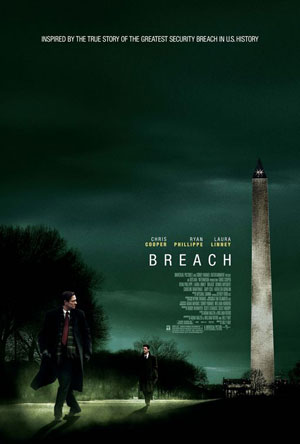 Robert Hanssen is a fascinating man. A patriotic American and FBI agent, Hanssen sold secrets to the Russians for over twenty years. A devout and strict Catholic and family man, Hanssen carried on an affair with a stripper and secretly videotaped sex with his wife. When he was finally arrested in 2001, Hanssen was one of the most damaging spies in American history, responsible for serious threats to national security and the deaths of American assets in Russia. Yet Billy Ray’s Breach, which is about the last month or so before Hanssen was arrested, leaves the man mostly a mystery, focusing instead on the far less interesting story of Eric O’Neill, a young FBI employee who ended up playing a critical part in the sting operation that nabbed the spy.
Robert Hanssen is a fascinating man. A patriotic American and FBI agent, Hanssen sold secrets to the Russians for over twenty years. A devout and strict Catholic and family man, Hanssen carried on an affair with a stripper and secretly videotaped sex with his wife. When he was finally arrested in 2001, Hanssen was one of the most damaging spies in American history, responsible for serious threats to national security and the deaths of American assets in Russia. Yet Billy Ray’s Breach, which is about the last month or so before Hanssen was arrested, leaves the man mostly a mystery, focusing instead on the far less interesting story of Eric O’Neill, a young FBI employee who ended up playing a critical part in the sting operation that nabbed the spy.
It’s an almost catastrophic misstep, one that essentially sinks the entire movie. It almost seems like part of a deliberate plot that writer/durector Billy Ray has to remove all drama from the film, leaving Breach as a very dry movie with an incredibly interesting man occasionally drifting across the screen.
O’Neill, played with forgettable affability by Ryan Phillipe, is recruited by Laura Linney, an FBI agent leading a task force dedicated to catching Hanssen in the act of spying. O’Neill, who hasn’t yet made agent, has two desirable traits: he’s Catholic and he knows computers, which are Hanssen’s two passions. O’Neill is told that Hanssen is a pervert, and that he needs to get in close to the man as part of a sting aimed at saving the Bureau embarrassment. O’Neill comes to actually like Hanssen, and it seems that the film is going to be about the younger man’s ethical dilemma in spying on someone he respects. But of course we know why O’Neill is really there, and once O’Neill finds out in the second act, all of the ethical issues fly right out the window. If there’s anybody it’s OK to lie to it’s a mole, so the movie has to fall back on the hackneyed “all these lies are putting a strain on my life” storyline, bringing O’Neill’s wife in to get cluelessly mad about her husband’s stressed out behavior.
All the while Billy Ray only gives us tantalizing glimpses into Hanssen, played superbly by Chris Cooper. It’s a performance for the ages, and that makes the whole movie that much more frustrating. Phillipe is fine, but more than a little boring as the goody two-shoes O’Neill, and every time the movie goes home with him you resent it for leaving the most interesting character behind. As O’Neill learns more about Hanssen’s history – the man was once put in charge of a counterintelligence unit that was tasked to ferret out a mole… he was hunting himself! – it’s hard to wonder why Ray chose this story to tell.
I never figured that out. Billy Ray’s debut film as a director was the fantastic Shattered Glass, a true story that stayed on a human level and never felt the need to add extraneous violence or car chases. It was a movie about ideas and ethics and it was comfortable addressing ideas and ethics on their own terms, not having the characters act them out in some manufactured stand off or action scene. It was a grown up movie that still managed to pack all the tension of your usual bullets and blood thriller. Breach has a more conventional setting than the journalistic milieu of Shattered Glass, but it has half the pulse of that movie. Shattered Glass and Breach are structurally similar in that there’s a liar at the center of the plot but not the story – in both films the focus is on the person discovering the truth. But there’s ethical complexity at play in Shattered Glass that’s missing from Breach for a number of reasons, chief among which is that a journalist who lies and steals stories is more morally ambiguous than a man who betrays his nation.
Billy Ray has his characters – including Hanssen himself – make the point that it doesn’t matter why the spy did what he did, just that he did it. And that’s true enough, but it feels like Ray has taken that thought to a damaging extreme. A movie that focuses on what Hanssen did – how he did it – and how he felt about it would not have necessarily needed to give up Hanssen’s motivations, or make excuses for him. And it a movie like that would have been gripping, as a thriller and as a psychological examination. Instead we get a movie that’s a restrained and respectable look at what might be the single least interesting aspect of a stunning true story.